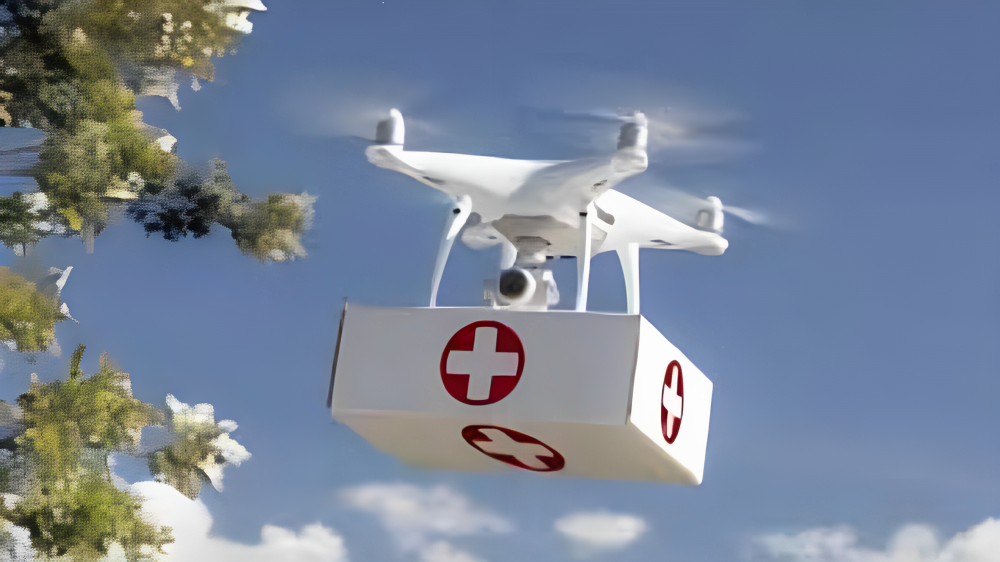Description

Copyright infringement not intended
Context: The Indian Council of Medical Research (ICMR) has successfully conducted a trial run of blood bag delivery under its iDrone initiative. The initiative aims to use drones for transporting blood and other medical supplies to remote and inaccessible areas of the country.
Details
- The trial run was conducted on May 10, 2023, a drone carrying a blood bag weighing 500 grams flew for a distance of 12 kilometres and delivered it safely at the designated location. The drone then returned to the base station with another blood bag.
About
- The iDrone initiative is a collaborative effort between ICMR, the Ministry of Civil Aviation, and the Directorate General of Civil Aviation.
- It is part of the larger Digital Sky Platform, which is a framework for regulating and enabling drone operations in India.
Objectives
- To address the challenges of blood transfusion services in rural and tribal areas, where access to blood banks and transportation facilities is limited.
Significance of the Initiatives
- According to ICMR, India needs about 15 million units of blood annually, but only collects about 11.5 million units.
- The gap is more pronounced in states with low human development indices, such as Bihar, Jharkhand, Chhattisgarh, and Madhya Pradesh.
- The use of drones for blood delivery can potentially save lives by reducing the time and cost of transportation, as well as ensuring the quality and safety of blood.
- Drones can also be used for delivering other essential medical supplies, such as vaccines, medicines, organs, and diagnostic samples.
- The initiative also aims to reduce the wastage of blood and enhance its quality by ensuring timely delivery and proper storage.

Drone Technology in the Healthcare Sector
About
- Drone technology has been rapidly evolving in recent years, offering new possibilities for various industries and sectors.
- One of the most promising applications of drones is in the healthcare sector, where they can provide faster, cheaper and more efficient delivery of medical supplies, vaccines, blood samples and organs.
- Drones can also assist in remote diagnosis, telemedicine, disaster relief and emergency response.
Challenges
Regulatory and legal issues
- There is a lack of clear and consistent regulations and standards for drone operations in different countries and regions.
- This creates uncertainty and confusion for drone operators, healthcare providers and authorities.
- There are ethical and privacy concerns regarding the use of drones for collecting and transmitting sensitive health data.
Technical and operational issues
- There are still limitations in the performance, reliability and safety of drones, especially in complex and dynamic environments.
- Drones need to be able to navigate autonomously, avoid obstacles and collisions, communicate securely and efficiently, and cope with weather conditions and interference.
- Drones need to be integrated with existing healthcare systems and infrastructure, such as hospitals, clinics and pharmacies.
Social and cultural issues
- There is a lack of awareness and acceptance of drone technology among the general public and some healthcare professionals.
- Some people may perceive drones as intrusive, noisy or dangerous, and may resist or reject their use.
- There may be cultural and religious sensitivities regarding the delivery of certain medical items or services by drones.
Steps need to be taken
- Developing and harmonizing regulations and standards for drone operations in healthcare settings, taking into account the specific needs and characteristics of different regions and contexts.
- Enhancing the technical and operational capabilities of drones through research and innovation, testing and evaluation, training and education, and quality assurance and control.
- Increasing the social and cultural acceptance of drone technology through public engagement, awareness campaigns, education programs, feedback mechanisms and ethical guidelines.
- Demonstrating the value and impact of drone technology in healthcare through pilot projects, case studies, impact assessments and best practices.

Conclusion
- The iDrone initiative is one of the first steps towards creating a drone-based healthcare delivery system in India. ICMR plans to conduct more trial runs in different terrains and weather conditions, as well as expand the scope and scale of the initiative. The ultimate goal is to establish a network of drone corridors that can connect blood banks, hospitals, and health centres across the country.
Must Read Articles:
Drones: https://www.iasgyan.in/daily-current-affairs/drones
|
PRACTICE QUESTION
Q. Drone technology has emerged as a promising solution for delivering essential medical supplies and services to remote and hard-to-reach areas, especially during emergencies and pandemics. However, the adoption and implementation of drone technology in the healthcare sector also face several challenges, such as regulatory barriers, ethical concerns, technical limitations, and social acceptance. How can these challenges be overcome and what are the best practices for ensuring the safety, efficiency, and sustainability of drone technology in healthcare?
|
https://www.thehindu.com/news/national/icmr-conducts-successful-trial-run-of-blood-bag-delivery-under-idrone-initiative/article66835394.ece











